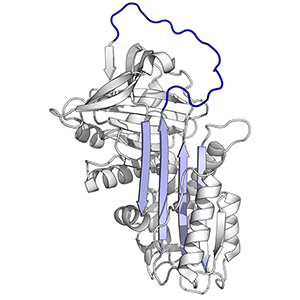Alpha1-antitrypsin deficiency and asthma

Accepted: February 16, 2022
All claims expressed in this article are solely those of the authors and do not necessarily represent those of their affiliated organizations, or those of the publisher, the editors and the reviewers. Any product that may be evaluated in this article or claim that may be made by its manufacturer is not guaranteed or endorsed by the publisher.
Authors
α1-antitrypsin deficiency (AATD) is a genetically inherited autosomal-codominant disease with a variable clinical spectrum of lung-related diseases. Pulmonary involvement of α1-antitrypsin deficiency may also include emphysema with variable functional and radiological abnormalities, asthma, and bronchiectasis. Asthma and AATD are mutually exclusive disease entities, but the commonality of neutrophil inflammation across the diseases might suggest common underlying mechanisms of effect. The diseases share many clinical and functional features: patients with AATD commonly first present with asthma-like symptoms; functional alterations may be common to both, such as bronchial hyperresponsiveness or fixed obstruction after bronchial remodeling. It has been recognized that allergy and asthma often coexist with AATD, but the relationship between allergy, asthma and AATD is not clear. Distinguishing AATD from asthma based on presentation and clinical evaluation is not possible. The clinician must assess each of the elements in the context of the whole patient, any patient with difficult-to-manage asthma should be screened for AATD. From the clinician’s point of view, improving diagnosis in this population is fundamental to optimize clinical management. Genetic studies will probably be needed in the future to unequivocally establish the causal link between AATD and asthma.
How to Cite

This work is licensed under a Creative Commons Attribution-NonCommercial 4.0 International License.
PAGEPress has chosen to apply the Creative Commons Attribution NonCommercial 4.0 International License (CC BY-NC 4.0) to all manuscripts to be published.
Similar Articles
- Lucrezia De Michele, Paola Pierucci, Guido Giovannetti, Arnaldo Scardapane, Carlo D'agostino, Giovanna Elisiana Carpagnano, Authors’ response to the Letter to the Editor regarding: Post severe COVID-19 infection lung damages study. The experience of early three months multidisciplinary follow-up , Monaldi Archives for Chest Disease: Vol. 92 No. 4 (2022)
- Davide Papi, Giulia Montigiani, Luca Bucciardini, How the work of respiratory physiotherapists changes the tracheostomy management and decannulation in a NICU department: an Italian experience , Monaldi Archives for Chest Disease: Vol. 93 No. 3 (2023)
You may also start an advanced similarity search for this article.

 https://doi.org/10.4081/monaldi.2022.2179
https://doi.org/10.4081/monaldi.2022.2179




